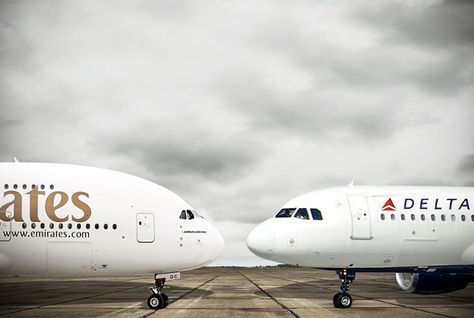News broke on Monday that the US Department of Justice is concerned with the request from Delta, American, and United to limit flights from Emirates, Etihad, and Qatar to the US. They are specifically worried about the impact on consumers – the potential for higher fares and fewer choices. These are two of the same concerns that JetBlue, Hawaiian, & Fedex expressed as part of their coalition against the Big 3.
Back in early August, JetBlue, Hawaiian Airlines, FedEx, and Atlas Air formed the US Airlines for Open Skies Coalition (USAOS) to oppose the efforts of Delta, American, and United to limit Gulf carrier traffic to the US. At the time they issued the following statements on why the opposed the action:
“Global competition is a fact of life,” said JetBlue President and CEO Robin Hayes. “Open Skies has opened the door to tremendous new opportunities for U.S. airlines including JetBlue – competition that benefits consumers and the economy – and we must oppose calls to roll back that progress and risk reverting to the old days of heavy government regulation of our industry.”
“The Big 3 say that they support Open Skies, but the actions they recommend would undermine it,” said FedEx CEO and President David Bronczek. “Those actions would breach our Open Skies agreements, provoke retaliation against U.S. carriers, and raise serious doubts about whether the United States is a reliable Open Skies partner.”
“The Big 3 do not speak for all, or even most, US airlines,” Hawaiian CEO and President Mark Dunkerley said. “Our coalition believes that the United States should honor its Open Skies commitments, which opens markets for U.S. carriers, promotes competition on international and domestic routes, and facilitates U.S. exports.”
“Open Skies has allowed U.S. cargo airlines to develop global networks which, in turn, have facilitated the rapid movement of U.S. military supplies around the world in times of need, including to and from Iraq, Afghanistan and the Persian Gulf,” said Atlas Air Worldwide CEO and President William Flynn. “Diminution of the U.S. commitment to Open Skies principles, especially the unrestricted right of carriers to expand services and enter new markets, would have long-term negative consequences for U.S. military readiness.”
USAOS later issued a press release with reasons why Open Skies has benefited the US and global economies and must be sustained going forward:
Open Skies expands international air service to more cities, both in the U.S. and world wide
Open Skies increases tourism to the United States, pumping more than $2 billion into the U.S. economy annually
Open Skies increases competition on U.S. domestic air routes as U.S. airlines not aligned with the Big 3 compete aggressively to attract travelers connecting to or from foreign carriers at U.S. gateway airports.
Open Skies promotes U.S. trade, jobs and economic growth. Such agreements (they’re not treaties in a formal sense) operate on the theory that by allowing unhindered competition among airlines (as opposed to governments agreeing on a limited number of routes, amounts of service and even fare prices) more travel demand is generated among both business travelers and those traveling for personal reasons.
Open Skies has become a key policy that makes it possible for businesses to operate efficient global supply chains and delivery networks that bring affordable goods to the masses.
Of course, Boeing hasn’t weighed in on the topic, but the three Gulf carriers have hundreds of firm orders in place worth billions of dollars. Etihad currently has 92 Boeing orders on the books!
Interesting related read – Evidence that Etihad Airways relies upon subsidies from Abu Dhabi’s government is especially compelling
Blast from the past – Emirates July/August 1996 Operations
The responses below are not provided or commissioned by the bank advertiser. Responses have not been reviewed, approved or otherwise endorsed by the bank advertiser. It is not the bank advertiser's responsibility to ensure all posts and/or questions are answered.
